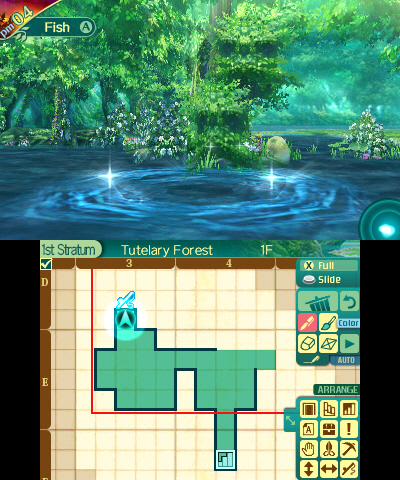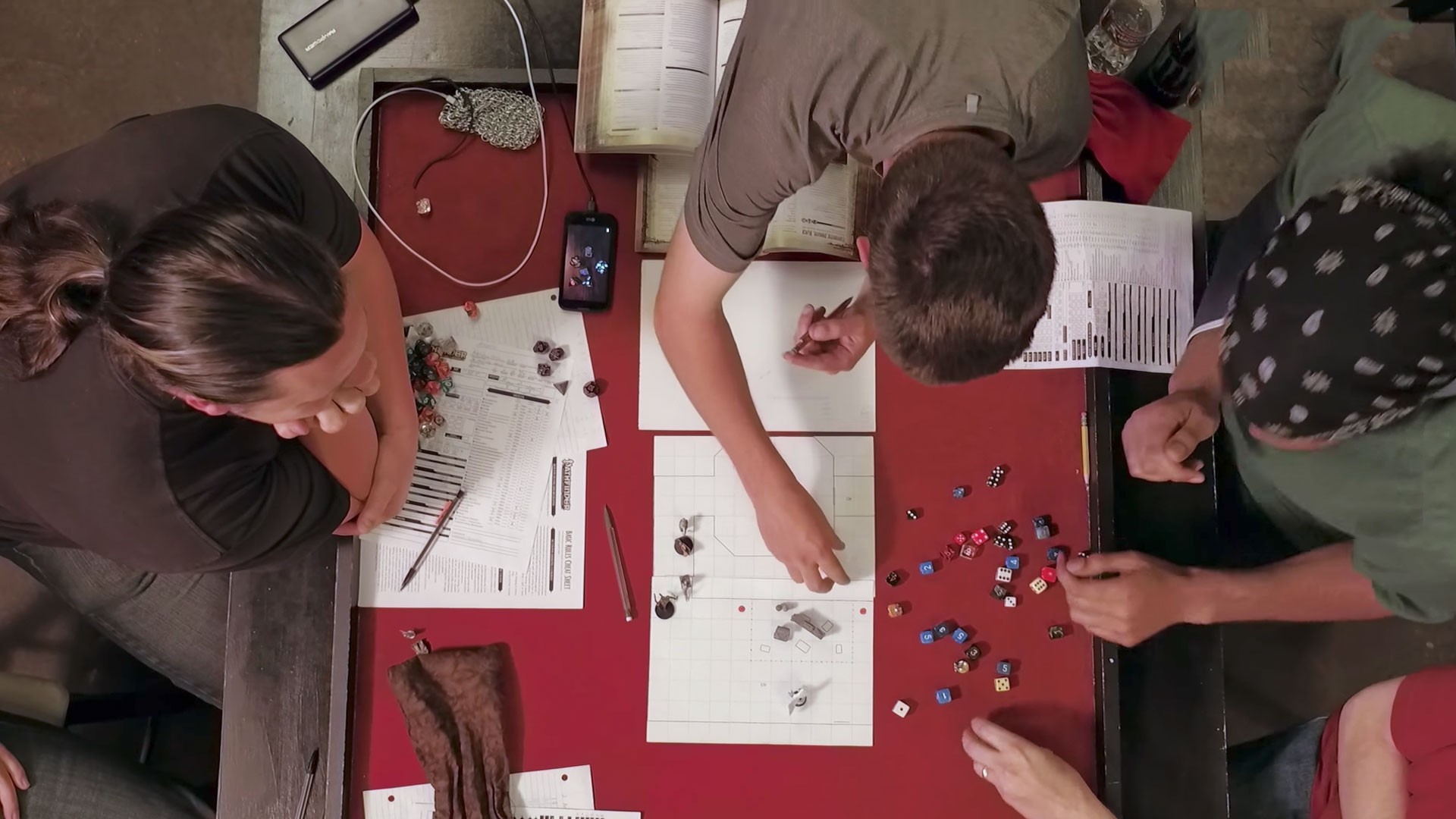Etrian Odyssey, you might recall, is the series of games where you draw maps by hand, a very simple and beautiful way to use the 3DS. Usually the game would do something like this for you, but this game doesn't; not because it's harder that way, not because "that's how games were way back then," but because it feels really good to slow down and make something intentionally with your hand, even if it's just drawing a map.
Advertisement
Rather than work for the stake of being difficult, it is work meant to make you more intentional, more aware of your surroundings and the dangerous place that you're slowly exploring, as it becomes more and more familiar but not never quite safe. Etrian Odyssey entries are the easiest hard games you'll ever play, games that sometimes gives you hard problems but always all the information to know how to solve them, and the tools to do it too.The series, rather than making large structural changes from game to game or adding many additional systems, finds more nuance and complexity in the encounter and level design that was created to hold a great deal of depth, and Etrian Odyssey V—which released this week—is particularly, even for the series, stripped to what it's always been and what it's always been good at.

Etrian Odyssey V is, in fact, two games: There's the one you play when you're at the 3DS, and there's the one you play when you aren't.The first is a game about a labyrinth: everything you do is here. This is the game where you are mapping, and exploring, and fighting. Etrian Odyssey plots are subtle and minimal, because the dungeon is the real star. It's about solving the labyrinth's puzzles and mysteries, harvesting its resources, and growing your party. It's not about moving from one story beat to another, even though that is a very fine thing for an RPG to do, and one of the things the genre is great at. But what makes Etrian Odyssey distinct is that it is really actually about exploring that dungeon, a dangerous places that you have to leave safely every time to save, and not a hero journeying over distances and branching paths.
Advertisement
The other Etrian Odyssey is the one where you daydream about your characters and plan how to build them, decide what you want to do next and how you're going to do it. RPGs with customizable main characters and branching storylines are totally wasted on me—I usually make someone cute and then say what I need to get what I want. I'm never even mean or selfish enough to be interesting. Etrian Odyssey is the game I actually roleplay in, and that's for two reasons possibly. The first is that I'm making not just one main character but the whole cast, and secondly the story doesn't really have a lot to do with them.Etrian Odyssey V, specifically, lets you pick between four character designs for each class, four pallet swaps of those, customize eye, hair, and skin color, and assign any of like forty voices to them, and there's absolutely no point to this whatsoever, it doesn't affect anything.What a relief. If you give me the tools to make my own OCs and a dramatic circumstance to put them in I can do the rest. That's the sort of control I want.

And it's easy to feel connected and get attached to these characters because they have to work very hard and you have to build them up. The Labyrinth is very dangerous and it makes the characters struggle, and that struggle is what builds the narrative. You can say that Etrian Odyssey is difficult, but you shouldn't say that without also saying that the game is extremely clear about what the dangers are, and all of those characters you create have a lot of tools for overcoming them.

And it's easy to feel connected and get attached to these characters because they have to work very hard and you have to build them up. The Labyrinth is very dangerous and it makes the characters struggle, and that struggle is what builds the narrative. You can say that Etrian Odyssey is difficult, but you shouldn't say that without also saying that the game is extremely clear about what the dangers are, and all of those characters you create have a lot of tools for overcoming them.
Advertisement
My Rover, February—who is some kind of bunny grandma—is handy with a bow and can do a lot of damage, but she comes with a dog who works harder than anyone else. He attacks enemies, takes hits for the party, licks our wounds to heal us (cute) and his owner has an ability called Animal Therapy that heals the team every turn he's in play (VERY CUTE). One of the major problems you have to deal with in Etrian Odyssey is just surviving so you can explore as long as possible before returning, and while our dog's healing is small and random, it's free, and that matters a lot when you have to manage your resources so carefully.In a lot of RPGs, fights are not terribly difficult and are mostly straightforward. But what Etrian Odyssey is good at is giving you real problems and challenges and then also interesting ways of solving those problems.There are normal enemies on the first floor of the dungeon that can kill a member of your party in a couple of hits, so you need to have a way to solve that problem. Your Botanist can heal the party, or your Dragoon can hide everyone behind a shield, or your Harbinger can try to paralyze the enemies before they do anything. You can't do nothing and expect to survive, but the game is really good at giving you lots of unique and interesting tools for surviving. It's just as good at reminding you that the threats are real and strict without killing you outright for not knowing. Be careful and check yourself, and it's okay to run home with your pride wounded and your lives intact.
Advertisement
Like drawing your own map, the difficulty in Etrian Odyssey V, like the very strictly designed games before it, is in the service of giving the player control over and understanding of the game and pacing her for the difficulty compassionately. Everything is always scary at first—the new enemy types will present new problems, like status effects, or area of effect damage, or burst so high it'll kill someone in one hit without something to mitigate it.So you look through your party for ways to solve that problem. You learn that they can't petrify a row of your party members if you "bind" the enemy's head, so you teach your Pugilist to give them a concussion (or you have your herbalist poison them and let the damage kill them while you can't move). As you figure out your solution, they slowly become less scary, and the labyrinth becomes more open, in exactly the same way that drawing the map turns the maze from a tense unknown into something familiar. The FOEs—mini-bosses that appear in the dungeon—make certain sections necessitate figuring out strategies to avoid them until you're strong enough to take them down, and then become confident to harvest them for rare items.Etrian Odyssey is also an unusually honest game, and that makes a big difference. There's an indicator in the corner that tells you when the next random encounter is, so you can make informed decisions about how many steps you're able to take safely. New areas are dangerous, and you draw the map so you understand your surroundings without thoughtlessly rushing in; the difficulty is always informing and building its own accessibility. If it wasn't a scatterbrained dork who's struggled with pathological attention problems her whole life like me could never play or enjoy a game like this."…difficulty as a concept is meaningless without a qualifier."
Advertisement
This is why difficulty as a concept is meaningless without a qualifier; it is obnoxious and annoying to do complex math in your head to optimize damage but it isn't particularly challenging, because there is a right answer, or a good enough answer. Once the calculation is made there is no longer any moves to make or challenge remaining; you execute. Hiding the math doesn't make it any more interesting.Many difficult games are also very accessible, and some games are only difficult insofar as they are inaccessible. Many games that are easy are never very accessible; most RPGs actually fall into this category. There can be a million stats and a million spells and esoteric systems you'll never understand, but none of it matters, because you can tell when one number is higher than another number, and the game never expects you to worry about anything else. To give you access to the rest of the game, they give up on giving you access to the part you're doing most of the time. You cast Blizaga every turn and don't sweat the details, and people who love esoterica figure it out online so you don't have to.These are things that I honestly can't do without a little help; my natural tendency is to rush through and do things quickly and haphazardly. Maybe the biggest reason why Etrian Odyssey V is NOT the Dark Souls of turn-based RPGs is because instead of just killing you like an idiot as something unexpected surprises you, it's always feeding you exactly all of the information you need to make an informed decision about what you want to do, gives you tools to solve all of those problems in ways that you want to, and lets you pull back before you make a mistake, and even after.The play of Etrian Odyssey isn't a pacing mechanic that only exists to get you from one story beat to the next, but a journey that is itself the point of the game. You don't draw the map to have a completed map. You draw the map because it's wonderful to draw a map.